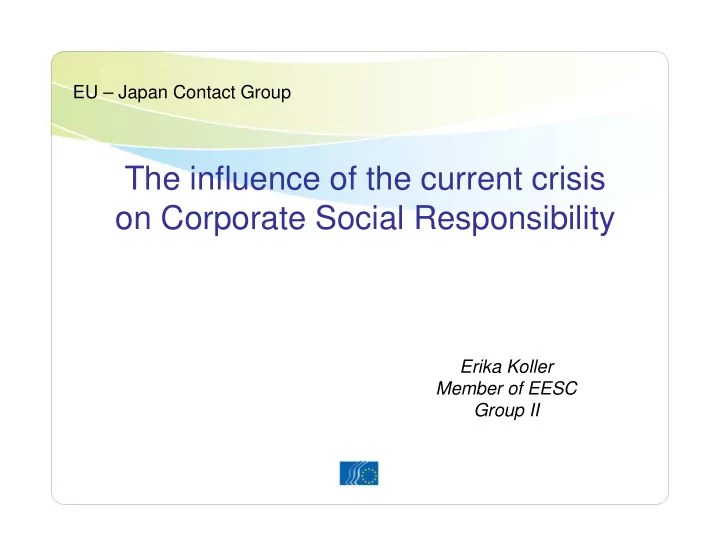

EU – Japan Contact Group The influence of the current crisis on Corporate Social Responsibility Erika Koller Member of EESC Group II
CSR in the EU under “normal” circumstances Short history overview – the European aspect of CSR CSR is present in the EU policies from 1993: The Commission identified that to build up a new, healthy, open and solidarity-based economy collective responsibility is also needed, in particular with regard to the entrepreneurial world
More completely defined in 1995 in “ Manifesto of Enterprises Against Social Exclusion ” Enterprises declared their commitment in the fight against social exclusion, making explicit reference to the twin concepts of progress and responsibility .
But only in 2000 became the CSR a focal point of the Union’s political agenda • The European Council made an explicit appeal precisely to the sense of corporate social responsibility as a key element for making the European Union “the most competitive and dynamic knowledge-based economic space in the world, capable of sustainable economic growth with more and better jobs and greater social cohesion ”
•The European Social Agenda also stressed the importance of CSR in terms of the social and employment consequences of economic integration picking up the general theme of the modernisation of the European social model through the investment in “human capital” • Later the Lisbon strategy was expanded with the specific integration of environmental and ecological theme s
2001 Green Paper Promoting a European framework for CSR “ the voluntary integration of the social and : ecological concerns of companies in their business operations and in their dealings with stakeholders”
The open debate and the results of the consultations with the social partners and civil society • Improve transparency • Dissemination • Exchange of good practices • Coordination at the national level and in third countries supporting the codes already existing globally (OECD, ILO, UN)
Remarks: •Contradiction between the voluntary nature and regulations • ETUC: necessary to have a common European system
Communication of July 2002 concerning CSR : A business contribution to Sustainable Development “Solid evidence that social and environmental responsibility supports competitiveness and sustainable development, in particular in SMEs, would be the best and most effective argument to encourage the uptake of CSR among enterprises”
The European Multistakeholder Forum It was originally conceived to promote the transparency of CSR practices and instruments and the exchange of experiences and good practices among the various actors at the EU level but in reality it was the occasion for starting a dialogue on the Forum’s mandate itself.
In 2006 the Commission’s second communication: Implementing the partnership for growth and jobs: Making Europe a pole of excellence on CSR • „CSR is fundamentally about voluntary business behaviour, an approach involving additional obligations and administrative requirements for business risks being counter-productive and would be contrary to the principles of better regulation.”
• “Social dialogue, especially at the sectoral level, has been an effective means for promoting CSR initiatives, and European Works Councils have also played a constructive role in the development of best practice on CSR. (…) The role of employees, their representatives and their trade unions in the development and implementation of CSR practices should be further enhanced”.
Recent events: •the last act of the Multistakeholder Forum Many NGOs didn’t take part at the Forum because the problems and objections raised during the previous session remained open, without any effort being made to clear up the situation.
The ETUC took part in the meeting, to attempt one last time to assert the necessity for a more balanced approach, by both business and the institutions, and to seek to relaunch the European intervention on the subject of certification, of the creation of a common centre of competence over CSR, and to organize regular meetings among the political groups.
•The intervention of the European Parliament “ companies should not be considered a substitute for public authorities when these fail to exercise control over compliance with social and environmental standards ”
“ Recognises that a debate remains open among different stakeholder groups on an appropriate definition of CSR and that the concept of 'beyond compliance' may enable some companies to claim social responsibility while at the same time not respecting local or international laws; believes that EU assistance to the governments of third countries in implementing social and environmental regulation consistent with international conventions, together with effective inspection regimes, are a necessary complement to advancing the CSR of European business worldwide. ”
CSR „A concept whereby companies integrate social and environmental concerns in their business and in their interactions with their stakeholders on a voluntary basis” (European Commission)
CSR – unemployment The present crisis Factories are closed down Less production Unemployment is still growing Can the CSR play a role in the mitigation of this process?
YES, INDEED! WITH •Strengthening the social dialogue •Supporting training of workers •Respecting the legal requirements in case of dismissal ensuring all kinds of support for workers And… We return to the very basic idea of CSR: companies are responsible for social issues
The ETUC point of view •Necessity to redefine CSR; it has to be more transparent and inclusive •CSR has to respect all stakeholders, not only interests of shareholders • CSR should not be an instrument to avoid social dialogue •To have a platform of sharing the best practices
The Economic and Social Committee adopted opinions on SCR 2006: ces1576-2006_ac_en.doc 2005: ces692-2005_ac_en.doc
Thank you for your attention!
Recommend
More recommend